Transitioning from Engineering to Consulting: Key Insights
Preparing for a Case Interview
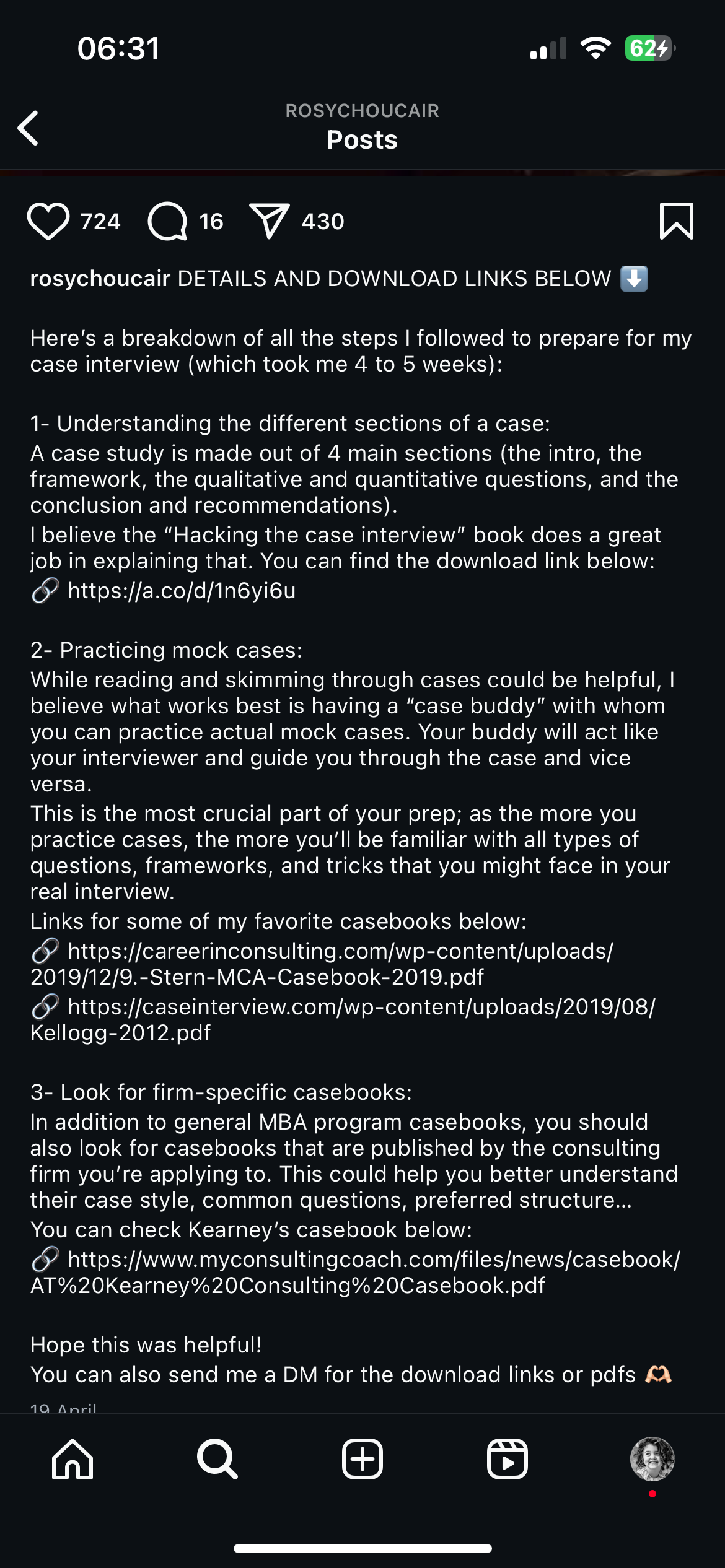
Steps for Preparation
1. Understanding the Different Sections of a Case
- Case Structure: Typically made up of four main sections: the introduction, the framework, qualitative and quantitative questions, and the conclusion with recommendations.
- Recommended Resource: "Hacking the Case Interview" book is suggested for a detailed explanation.
- Download Link: Hacking the Case Interview
Insight: Familiarizing yourself with the structure helps in organizing your thoughts and responses during an interview. It's essential to break down each section and understand its purpose.
2. Practicing Mock Cases
- Approach: Practicing with a "case buddy" can be very effective. Your partner acts as the interviewer, helping guide you through the process.
- Importance: Vital for becoming familiar with the types of questions, frameworks, and interview techniques.
- Recommended Resources:
Insight: Consistent practice with realistic scenarios builds confidence and hones analytical and communication skills, essential for success in case interviews.
3. Look for Firm-Specific Casebooks
- Additional Resources: Seek out casebooks published by the consulting firm you're aiming for.
- Purpose: Understanding the specific style and typical questions of different firms can provide an edge.
- Example:
Insight: Tailoring your preparation with firm-specific materials helps in understanding unique case styles and expectation nuances, crucial for firm-specific interviews.
Conclusion
Engaging fully in these steps can greatly enhance your readiness for a case interview. Thorough preparation and practice are keys to excelling in these challenging settings.
Extended readings:
Consulting Career Preparation Guide
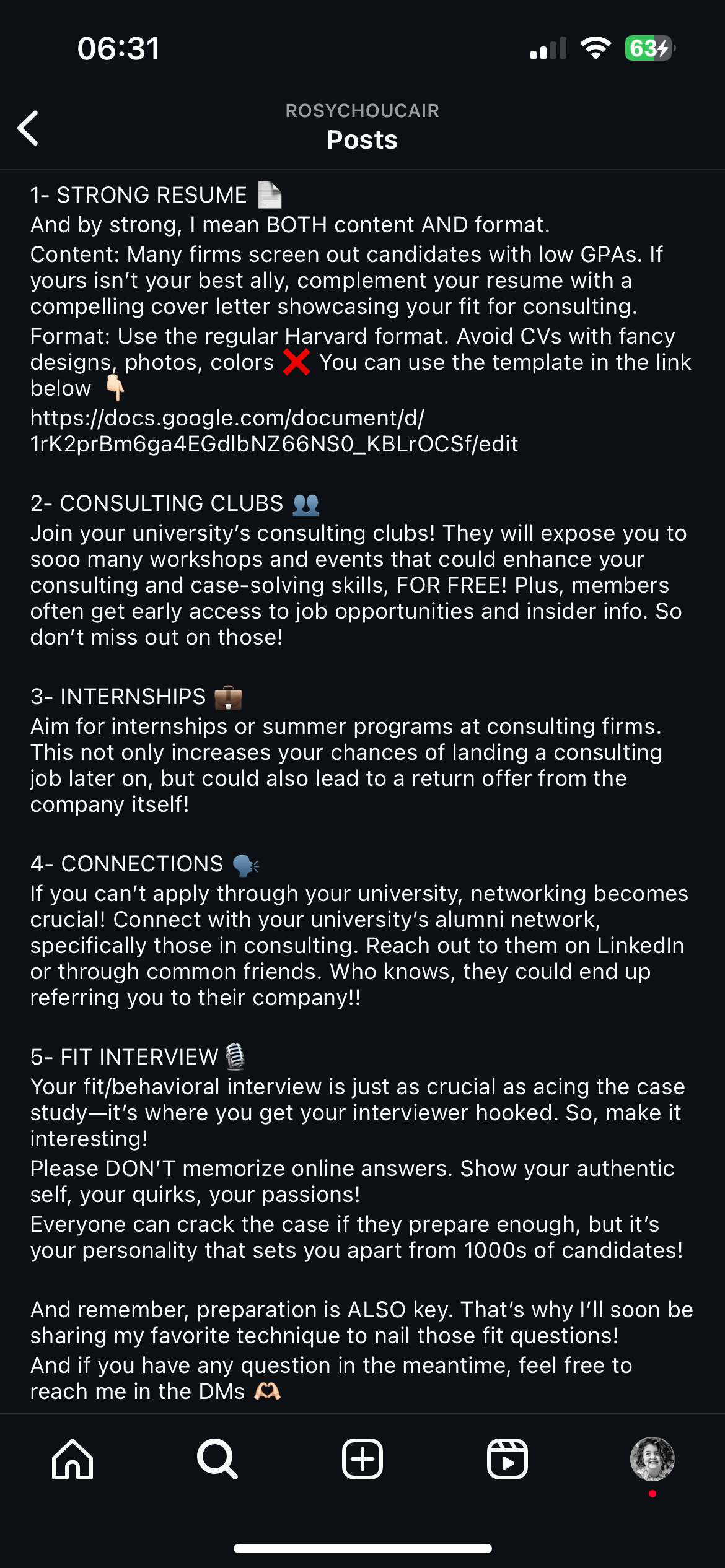
1. Strong Resume 📄
-
Content: Focus on strong content. If your GPA isn't high, emphasize your fit for consulting in your cover letter.
- Insight: Tailoring your resume with specific achievements and skills relevant to consulting can boost your application.
- Additional Info: A compelling cover letter can help offset a lower GPA by highlighting your experiences and potential contributions.
-
Format: Use the Harvard format for your resume. Avoid using fancy designs, photos, or colors.
- Insight: A clean and professional format showcases professionalism and clarity.
- Additional Info: The Harvard format is a standard that ensures resumes are concise and easy to read.
2. Consulting Clubs 👫
- Opportunity: Join university consulting clubs to access free workshops and events to improve consulting skills.
- Insight: These clubs often offer networking opportunities with alumni and industry professionals.
- Additional Info: Early access to job opportunities can provide a competitive edge.
3. Internships 💼
- Goal: Aim for internships or summer programs at consulting firms.
- Insight: Internships can lead to full-time offers, making them a crucial stepping stone in a consulting career.
- Additional Info: Practical experience gained through internships can enhance your resume and skills.
4. Connections 🗨️
- Networking: Connect with alumni and use platforms like LinkedIn to extend your network.
- Insight: Personal connections can often lead to job referrals.
- Additional Info: Networking is a critical skill that can open doors to hidden job markets.
5. Fit Interview 🧾
-
Importance: The fit/behavioral interview is as important as case studies.
- Insight: This interview showcases your personality and suitability for the company culture.
- Additional Info: Avoid memorizing answers; instead, demonstrate authenticity and passion.
-
Preparation: Be well-prepared and show your true self, including your quirks and passions.
- Insight: Personality can differentiate you from other candidates during interviews.
- Additional Info: Practice answering behavioral questions to effectively communicate your experiences and insights.
Additional Tips
- Preparation is Key: Use techniques to master fit questions.
- Resources: Seek out guides or workshops that offer tips on handling behavioral interviews.
- Contact: For further inquiries, feel free to reach out via direct messages for personalized advice.
Extended readings:
Pursuing a Career in Consulting: Key Steps
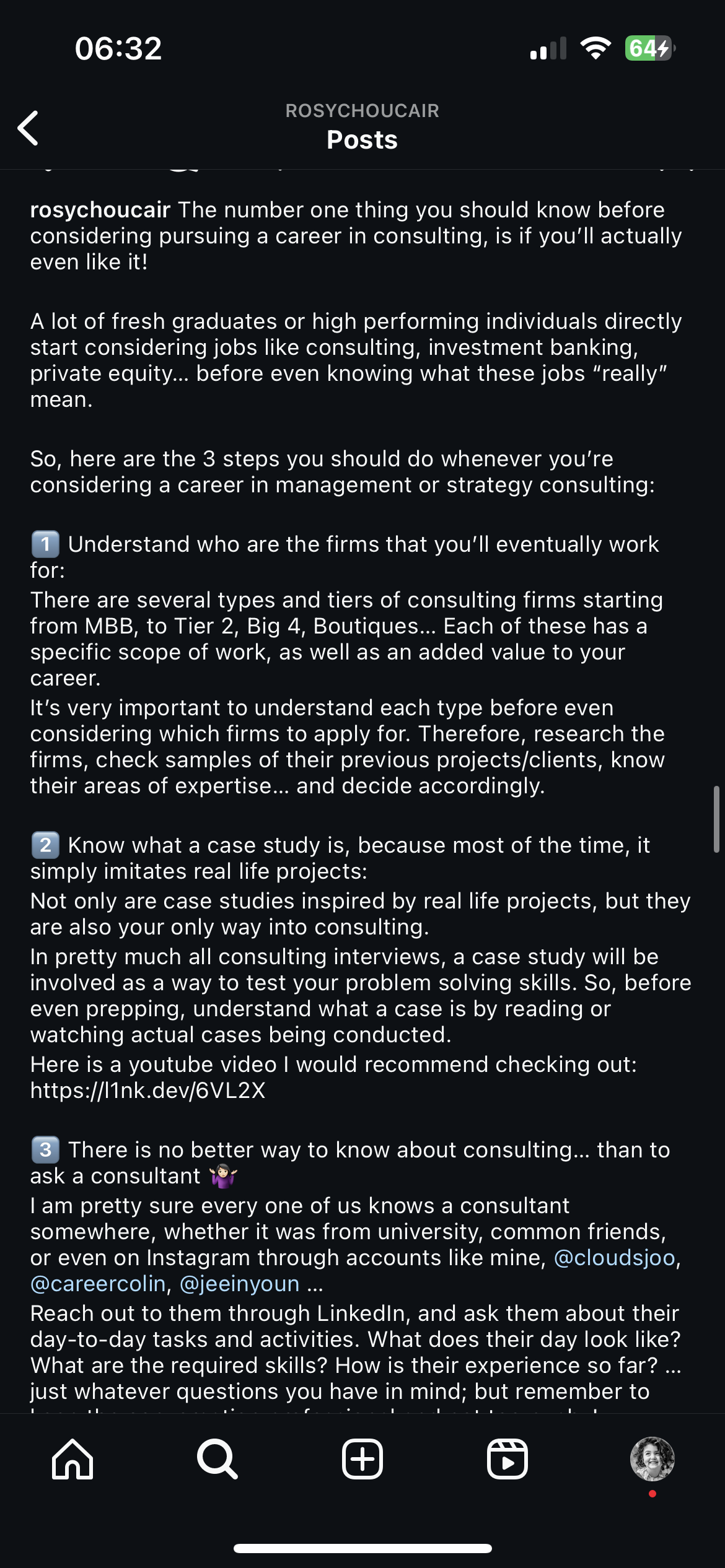
Introduction
Before diving into a consulting career, it’s vital to assess if it resonates with your interests and goals.
Key Considerations
Many fresh graduates swiftly consider roles in consulting, investment banking, or private equity without fully understanding these fields.
Essential Steps in Considering Consulting
1. Understand Firm Types and Tiers
-
Firm Categories: Consulting firms are often categorized into MBB (McKinsey, BCG, Bain), Tier 2, Big 4, and Boutiques. Each type brings unique work scope and career value.
-
Research Importance: Investigate various firms, review their project samples, understand their expertise areas, and determine alignment with your career goals.
Insight: Different firm tiers suggest varying work environments and expertise focus, impacting your career trajectory.
2. Grasp the Concept of Case Studies
-
Relevance in Consulting: Case studies typically reflect real-world projects and are crucial for consulting entry.
-
Interview Preparation: Most consulting interviews include case studies to assess problem-solving skills. Familiarize yourself by reading or watching case studies.
-
Recommendation: Check out the YouTube video here: YouTube Link.
Additional Info: Practicing case studies can help streamline your thought process during interviews.
3. Connect with Consultants
-
Networking: Utilizing connections from university, mutual friends, or platforms like LinkedIn can provide insights into the consulting world.
-
Inquiry Focus: Ask about their daily tasks, required skills, and their journey in consulting.
Tip: Engaging directly with professionals offers firsthand experience and knowledge, exceeding generic research.
Conclusion
Taking these steps can provide a clearer, more comprehensive view of what a consulting career entails, helping you make an informed decision.
Extended readings:
Transitioning to Consulting from Engineering
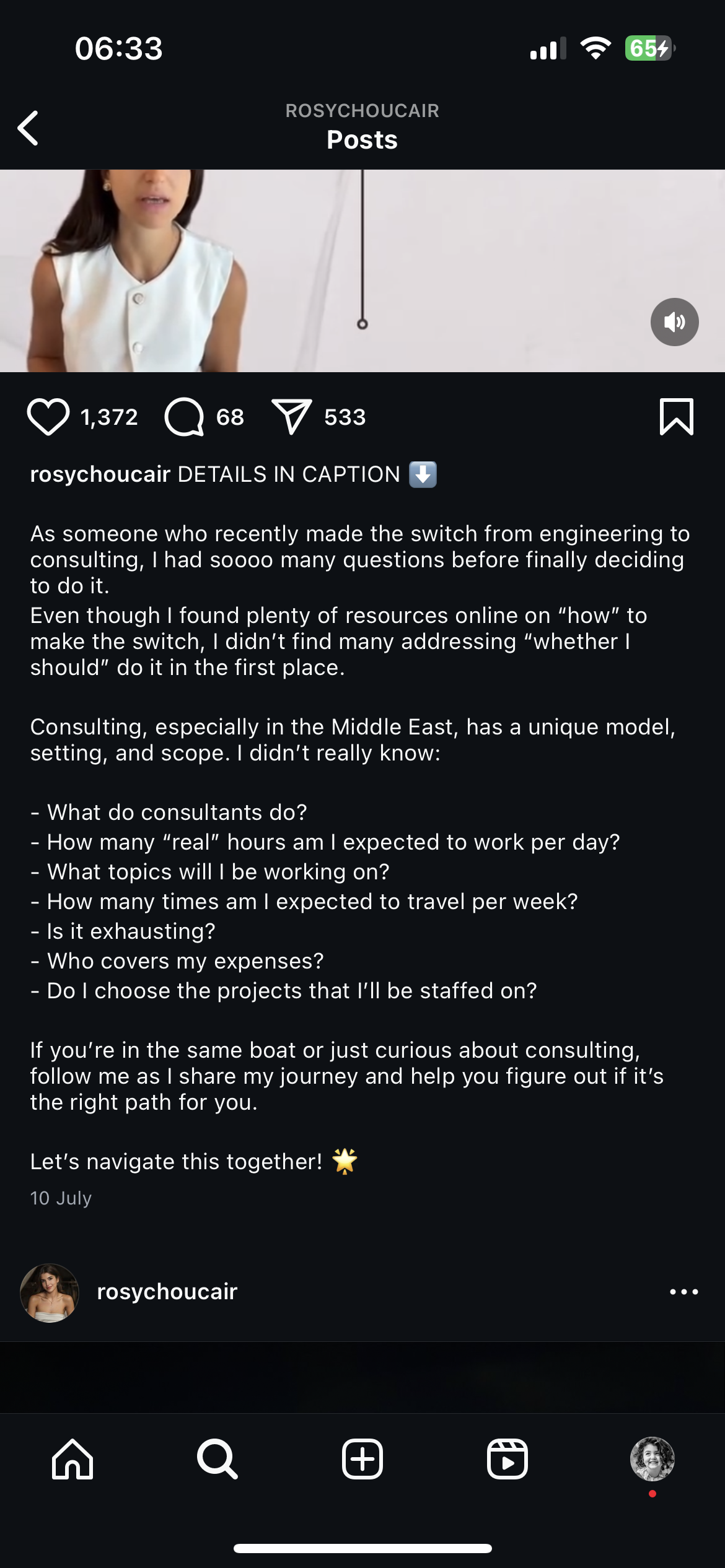
Overview
- Transitioning from engineering to consulting can raise numerous questions and uncertainties.
- Despite available resources on "how" to switch careers, guidance on "whether" to switch can be lacking.
Consulting in the Middle East
- Consulting in this region has a unique model, setting, and scope.
Key Questions Addressed
-
What do consultants do?
- Consultants provide expert advice to organizations in particular areas such as management, finance, and IT.
- They help solve problems, enhance performance, and provide strategic insights.
-
Work Hours Expectations
- Real work hours may extend beyond the typical 9-to-5, involving overtime during busy periods.
- It's crucial to understand the work-life balance and time management required in consultancy roles.
-
Topics of Work
- Consultants often handle a variety of projects across different industries and sectors.
- Each project might require unique skills, research, and strategic planning.
-
Travel Frequency
- Travel is often part of a consultant’s job, especially for client-facing roles.
- Understanding the travel requirements can help in planning personal life and commitments.
-
Job Exhaustion
- Evaluate the intensity and stress levels associated with consultancy roles.
- It's important to consider personal resilience and coping strategies for maintaining well-being.
-
Expense Coverage
- Typically, expenses incurred during work travel or client visits are covered by the firm.
- Knowing the firm’s policy on expenses is vital for financial planning.
-
Project Selection
- Consultants sometimes have the opportunity to choose projects based on their interests and expertise.
- However, this choice can vary across firms and job levels.
Community and Support
- This journey is a collective one, and sharing experiences can help others in a similar transition.
- Engaging with communities and networks can provide insights and support.
Conclusion
- Navigating a career switch requires understanding of expectations, challenges, and personal goals.
- Collaborative exploration and shared stories can make the transition smoother and more informed.
Extended readings:
Beginner’s Guide to Consulting Case Studies
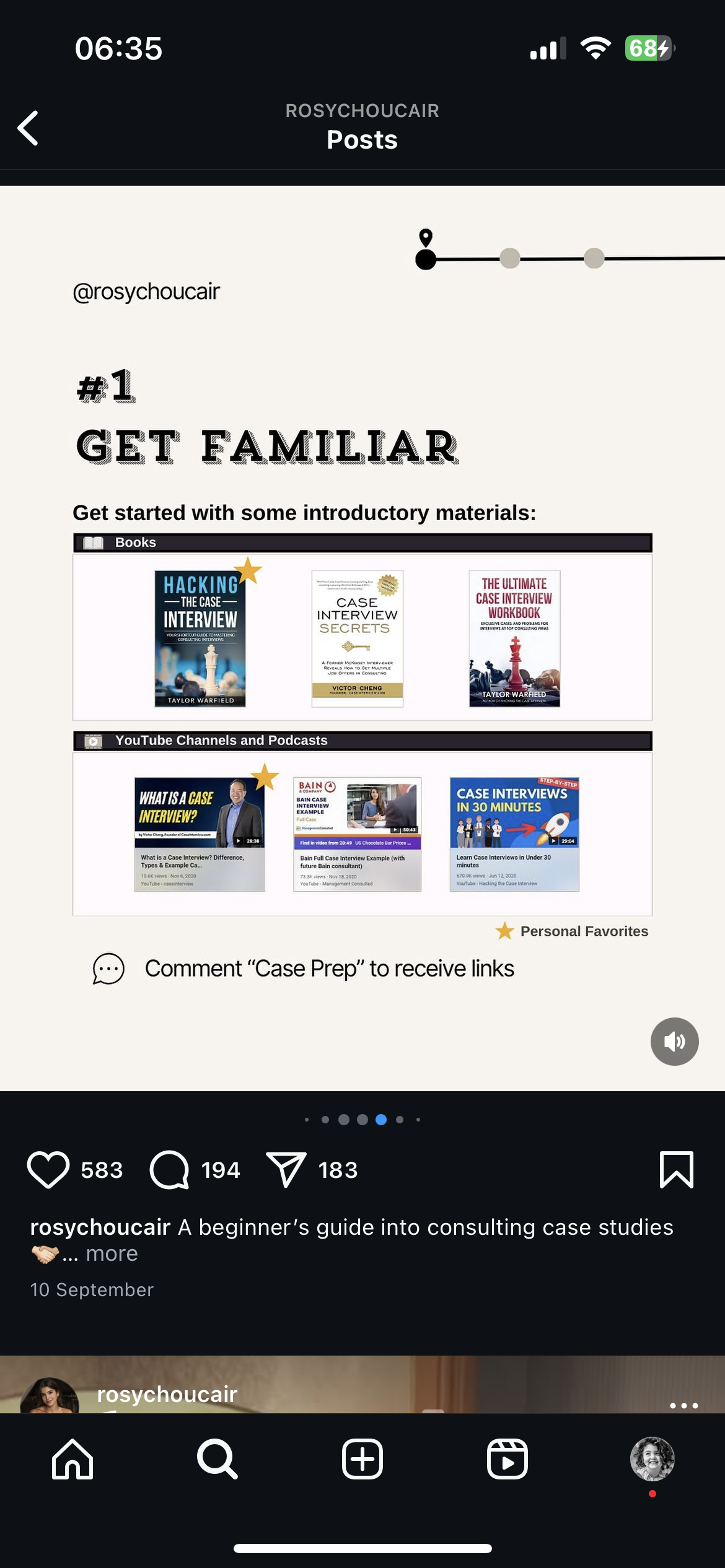
Introduction
This guide focuses on helping beginners familiarize themselves with consulting case studies, which are crucial for succeeding in consulting interviews.
Recommended Materials
Books
-
Hacking the Case Interview by Taylor Warfield
- Insight: This book provides strategies and frameworks to approach case interviews.
- Additional Info: It often includes real-life examples and tips from industry experts.
-
Case Interview Secrets by Victor Cheng
- Insight: Victor Cheng offers insider tips and techniques for case interviews.
- Additional Info: It’s renowned for teaching the frameworks necessary for solving case questions effectively.
-
The Ultimate Case Interview Workbook by Taylor Warfield
- Insight: This workbook complements the main book, offering practice problems and exercises.
- Additional Info: Practice is key to mastering case interviews, and workbooks are excellent resources for hands-on learning.
YouTube Channels and Podcasts
-
What is a Case Interview?
- Insight: Video content explaining the basics of case interviews and their different types.
- Additional Info: Understanding the structure and expectations of case interviews is crucial.
-
Bain Full Case Interview Example
- Insight: Offers a walkthrough of a complete case interview with a Bain consultant.
- Additional Info: Real examples from top consulting firms help in understanding the level of detail and analysis required.
-
Case Interviews in 30 Minutes
- Insight: Quick overview and tips for case interviews to prepare efficiently.
- Additional Info: Great for time-pressed candidates needing quick yet comprehensive insights.
How to Access Resources
- Comment "Case Prep" : By commenting with this phrase, you can receive links to the recommended materials.
Tips for Beginners
- Start by understanding the basic structure and types of case interviews.
- Use a combination of reading materials and visual content to grasp various techniques.
- Practice consistently with mock interviews and case studies from top consulting firms.
Conclusion
Becoming familiar with different resources, such as books and practical examples, will significantly improve your confidence and ability to perform well in consulting case interviews.
Extended readings: